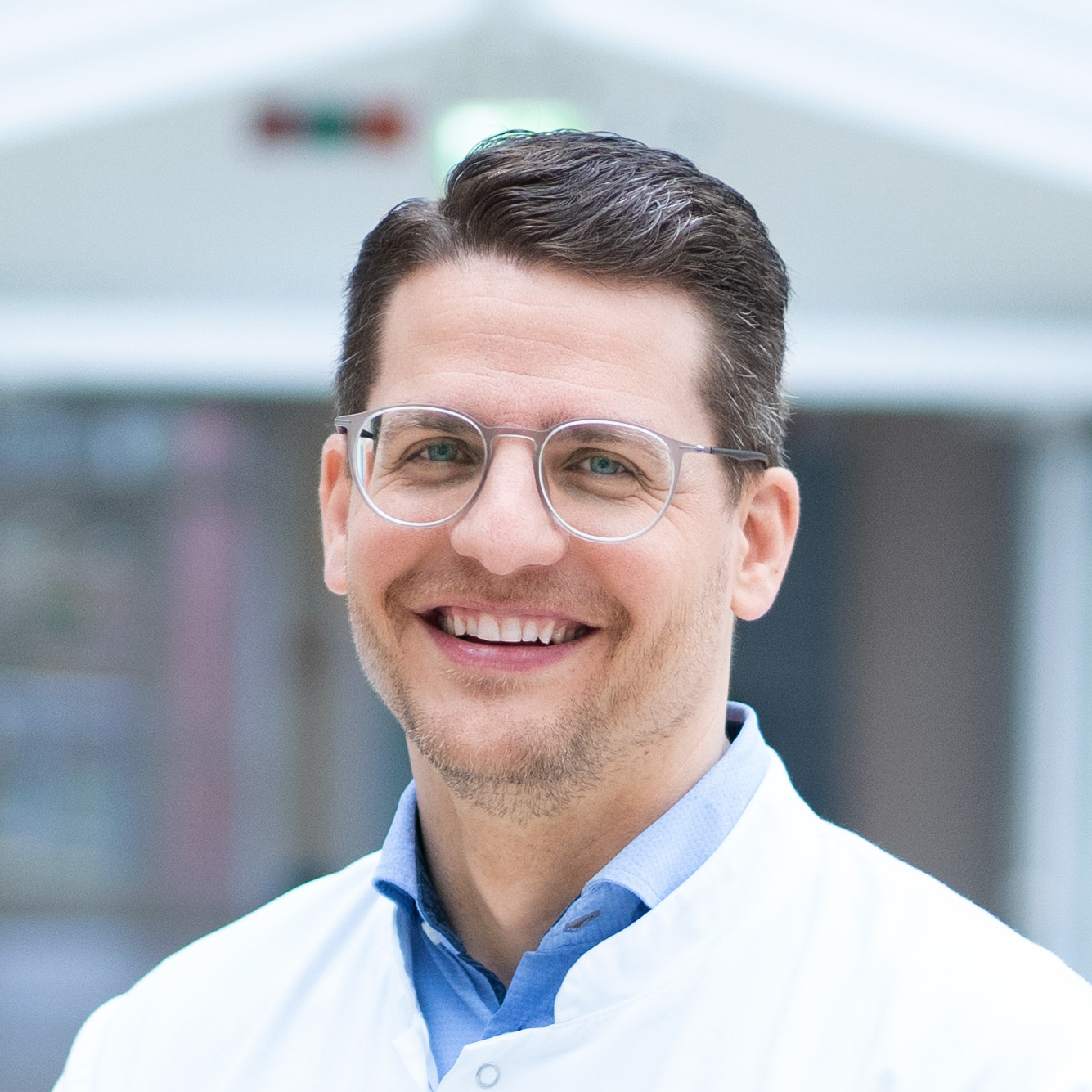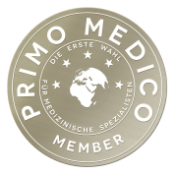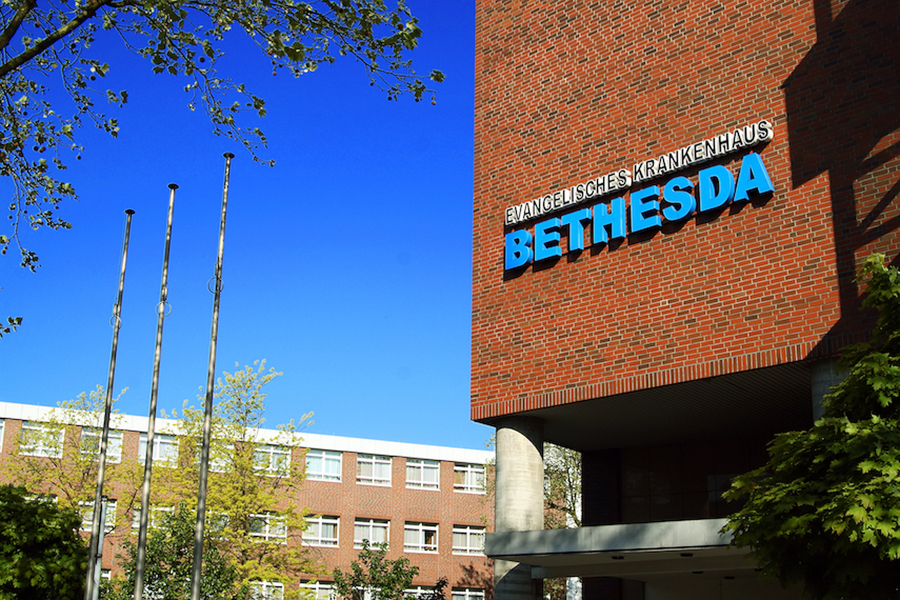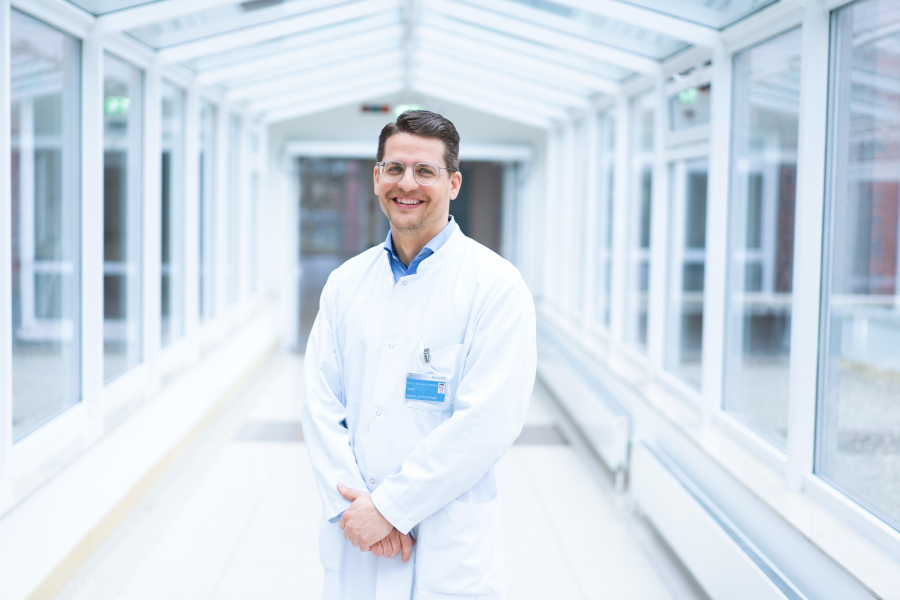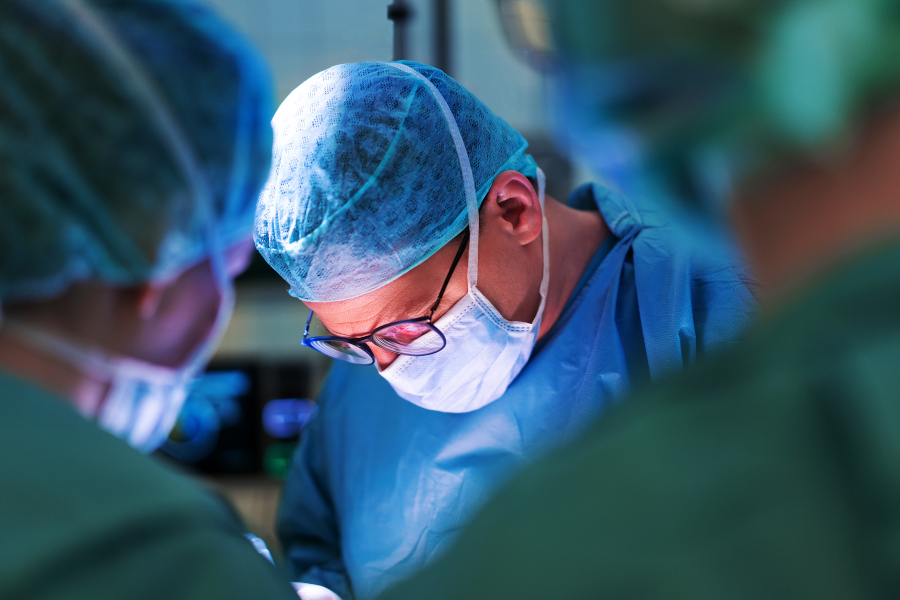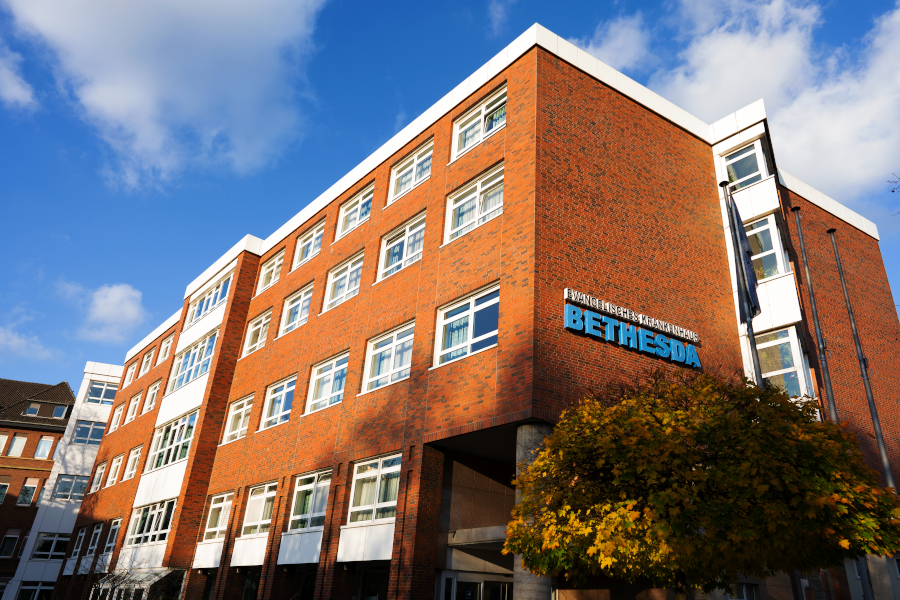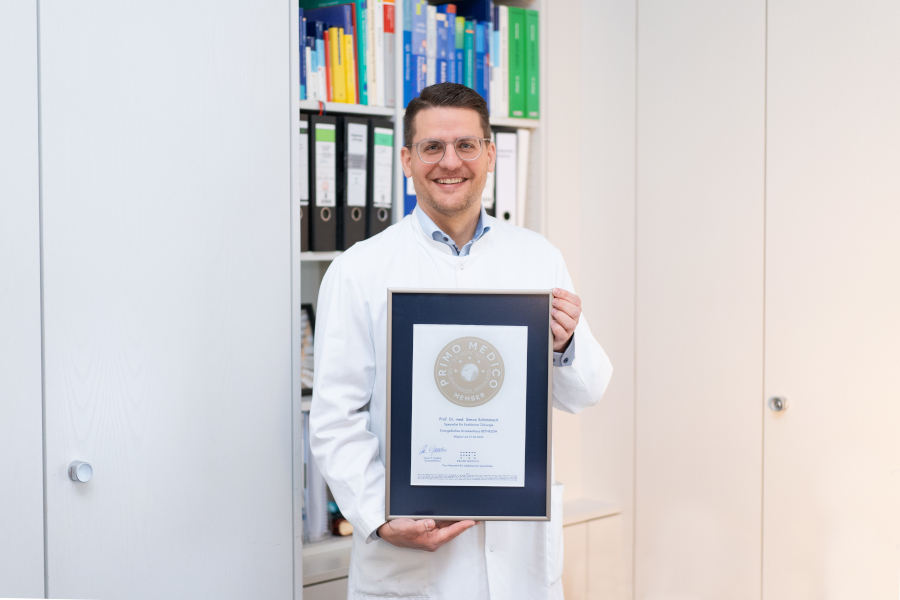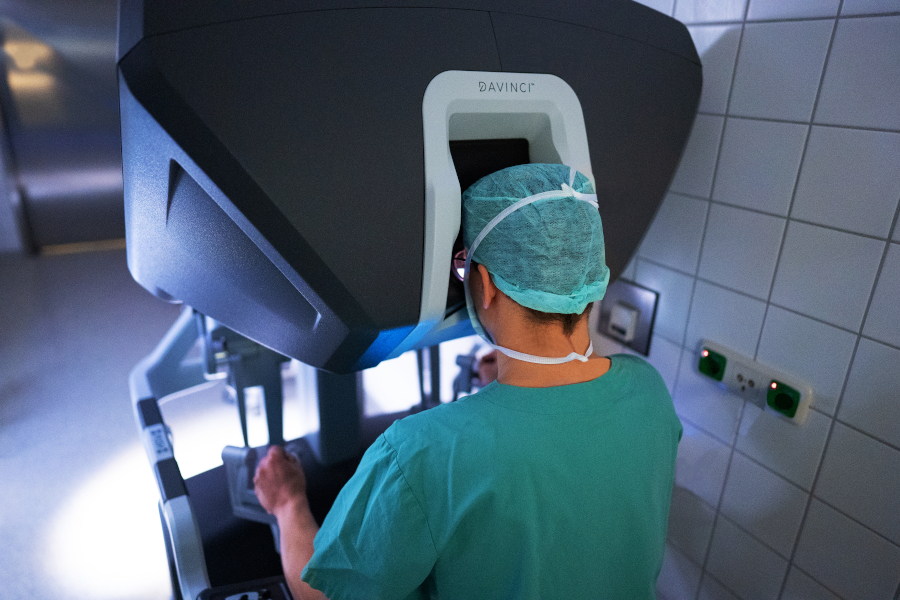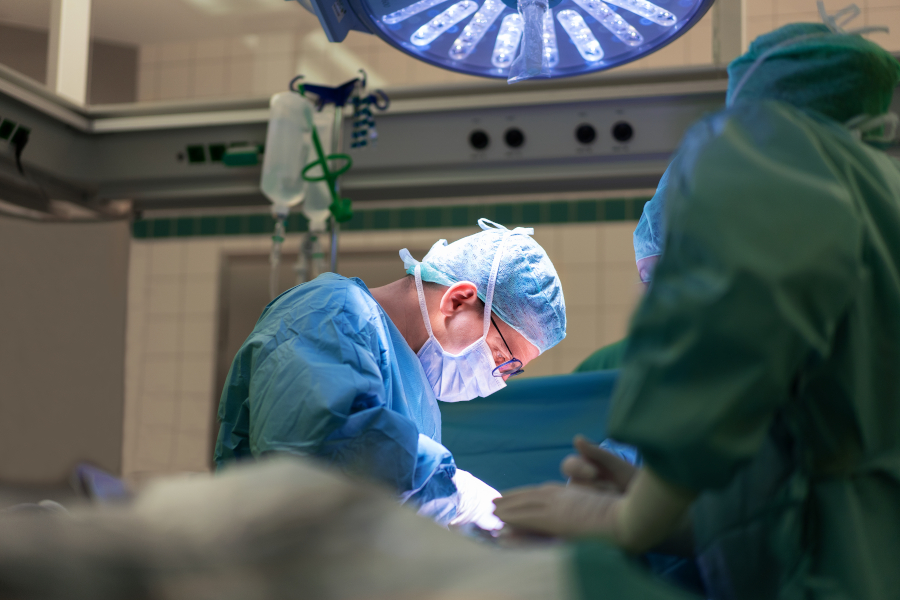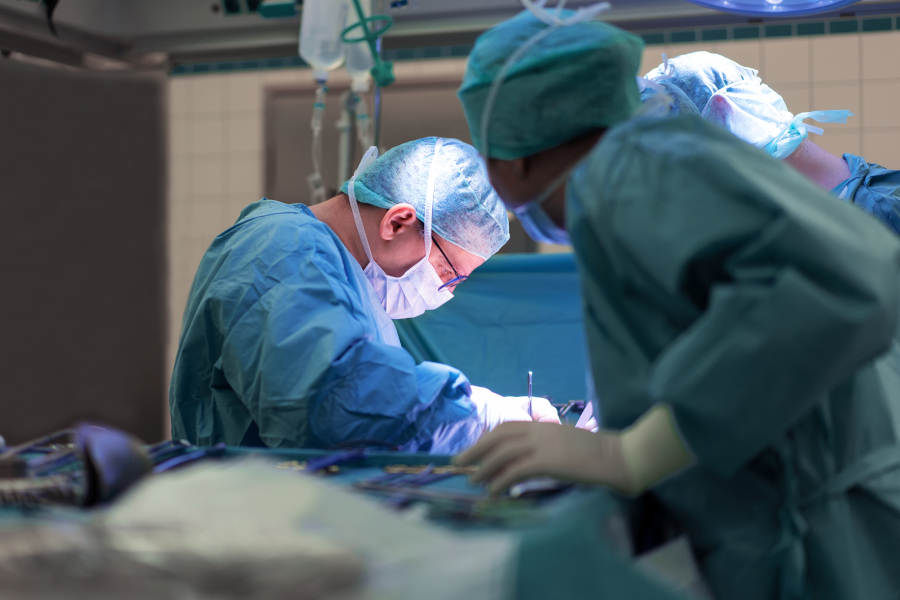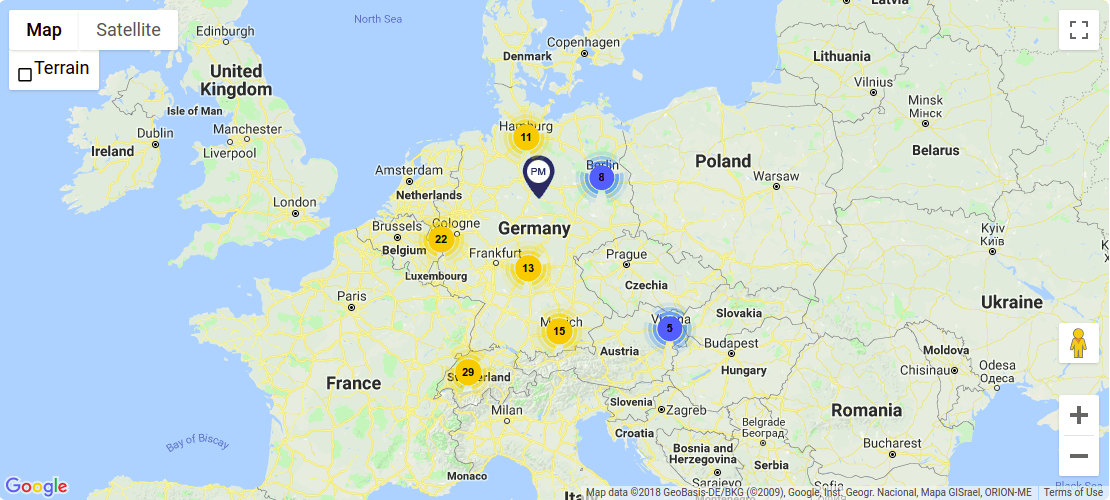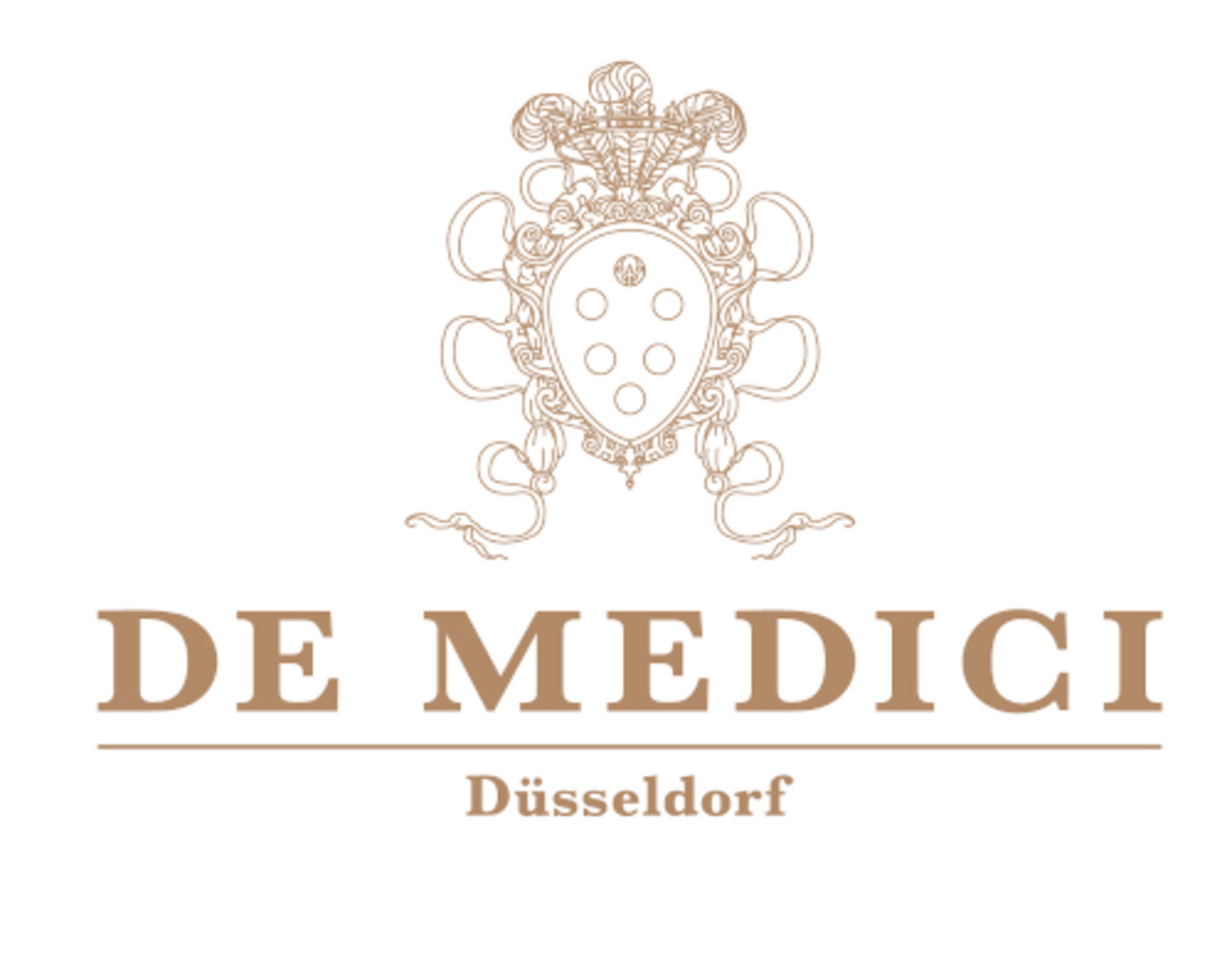Endocrine Surgery Duisburg (NRW): Prof Schimmack
Treatment focus
- Diseases and tumors of the pancreas (pancreatic carcinoma, IPMN, neuroendocrine neoplasms of the pancreas, pancreatitis, mucinous and serous neoplasms)
- Diseases and tumors of the adrenal gland (Conn, Cushing, pheochromocytoma, adrenal metastases, incidentalomas)
- Diseases and tumors of the thyroid gland (thyroid cancer, hyperthyroidism, symptomatic thyroid enlargements)
- Diseases and tumors of the parathyroid gland (hyperparathyroidism [HPT], Carcinoma of the parathyroid gland)
Contact
Evangelisches Krankenhaus BETHESDA
Department for General and Visceral Surgery
Heerstraße 219, D-47053 Duisburg
P: +49 203 3969 3527 F: +49 203 6008 1199
Consultation Hours:
Tuesday-Thursday from 3:30 PM - 5:30 PM and by appointment

Medical Range
Range of Diagnostic Services
- Laboratory diagnostics
- Sonography
- CT
- MRI
- Endosonography
- Endoscopies (gastroscopy, colonoscopy, ERCP)
- Bioptic confirmations of all kinds of tumors
- Explorative laparoscopy
- Selective venous catheterization
- PET-CT (University of Essen)
Range of Therapeutic Services
Prof Schimmack (together with his surgical team and the team of BETHESDA Hospital) offers the entire spectrum of conservative and surgical therapy for diseases of the endocrine organs (pancreas, adrenal gland, thyroid gland, parathyroid gland).
- Robot-assisted minimally invasive resection of pancreatic tumors
- Oncological resections of pancreatic tumors
- Parenchyma-sparing resections of pancreatic tumors
- Treatment concepts for hyper- or hypofunction of the pancreas
- Robot-assisted minimally invasive (partial) resection of adrenal tumors or adrenal metastases
- Open oncological resection of carcinomas of the adrenal gland
- Treatment concepts for hyper- or hypofunction of the adrenal glands
- Radical resection of malignant diseases of the neck organs with the removal of all lymph nodes while sparing the nerves under continuous neuromonitoring
- Resection of diseased thyroid and parathyroid glands under continuous neuromonitoring
- Treatment concepts for hyper- or hypofunction of thyroid glands or parathyroid glands
- Radiofrequency ablation of thyroid nodules
- Microwave ablation of liver metastases
- Nuclear medical and radiation oncological treatment of benign and malignant diseases of the endocrine organs (e.g., PRRT)
More Information
Card
Prof Dr Simon Schimmack is a specialist in endocrine surgery and head physician of the Department of General and Visceral Surgery at the Evangelisches Krankenhaus BETHESDA in Duisburg. He acquired his surgical training at the largest surgical Hospital in Germany, the Heidelberg University Hospital and European Pancreas Center, and brings this expertise to the Ruhrgebiet.
Prof Schimmack and his team operate daily on patients with diseases of the hormone-forming glands with the highest professional competence and the most modern technical equipment. In doing so, the individual is the focus of attention and is respected and appreciated.
Endocrine Surgery in Duisburg: Experienced Specialist for Thyroid Gland Diseases
Endocrine surgery focuses on diseases of organs that produce hormones and release them into the blood. These include the thyroid, parathyroid, pancreas, and adrenal glands. Prof Dr Simon Schimmack has a wide-ranging spectrum of treatments focusing on treating pathological changes in the thyroid gland.
The thyroid hormones fulfill vital tasks and are significantly involved in regulating growth and metabolic processes. Over- or under-functions of the thyroid gland have far-reaching consequences and affect the entire organism. In many cases, the thyroid tissue is significantly enlarged.
The Department of Endocrine Surgery at BETHESDA Evangelical Hospital specializes in the surgical removal of pathologically altered thyroid tissue. Such interventions always require careful surgical preparation, including detailed diagnostics and a precise surgical procedure. Continuous neuromonitoring is standard in every surgery to minimize the risk of injury to surrounding nerves during the procedure and reduce consequential damage.
Comprehensive Range of Services and Therapeutic Options for Thyroid Cancer
Changes in thyroid tissue can also indicate cancer. At BETHESDA Hospital, extensive diagnostic measures are carried out to detect possible cancer as quickly as possible and to initiate adequate therapy.
When choosing a suitable treatment strategy, the focus is always on the patient and their individual needs and circumstances. Surgeons, radiotherapists, and oncologists work closely together to design a unique treatment concept for each patient in interdisciplinary collaboration.
Prof Dr Simon Schimmack and his team offer patients a wide range of services, including surgical removal of cancerous tissue and conservative measures such as radioiodine therapy.
Radioiodine therapy takes advantage of the fact that some thyroid tumors absorb large amounts of iodine. Radioactive iodine is applied, absorbed into the corresponding cells, and destroys the diseased tissue in a targeted manner. This form of therapy can be used for certain forms of thyroid cancer as well as for benign hyperthyroidism with organ enlargement.
State-of-the-Art Therapy & Minimally Invasive Surgery for Diseases of the Adrenal Gland and Adrenal Medulla
The adrenal glands are on top of the two kidneys, each consisting of the cortex and the adrenal medulla. The cortex produces various hormones to regulate water and electrolyte balance and sex hormones.
One of the best-known adrenal cortex diseases is Conn's syndrome, in which too much aldosterone is produced. Patients then usually suffer from disturbances of the electrolyte balance and hypertension, which is difficult to control because of the excess hormone.
Cushing's syndrome results from the excessive production of cortisol in the adrenal cortex. Typical symptoms include truncal obesity, elevated blood sugar levels, and high blood pressure.
The adrenal medulla produces the hormones dopamine, epinephrine, and norepinephrine, which are released more significantly during stressful situations. Tumors of the adrenal medulla, such as pheochromocytoma, can lead to the inadequately high secretion of these hormones, which can cause high blood pressure, excessive sweating, headaches, and restlessness in affected individuals.
The Department of Endocrine Surgery at BETHESDA Evangelical Hospital, headed by Prof Dr Simon Schimmack, specializes in the surgical treatment of adrenal gland tumors. The team relies on minimally invasive and robotically assisted surgical techniques to offer patients the gentlest and lowest-risk treatment method possible.
Highest Expertise in Diagnosis and Therapy of Tumors of the Pancreas
The pancreas comprises a hormone-producing part (endocrine) and cells that produce digestive enzymes and release them into the small intestine (exocrine). Endocrine surgery mainly treats diseases of the hormone-producing pancreas.
The most important hormones of the pancreas are insulin and its counterpart glucagon. Simply put, insulin lowers blood glucose levels by absorbing sugar into cells, while glucagon raises them. Pancreatic tumors that cause excessive production of the hormones, therefore, trigger blood glucose disorders in those affected. One example of this is the so-called insulinoma.
Prof Dr Simon Schimmack has far-reaching experience in the surgical treatment of pancreatic tumors. He is characterized by using an exact procedure so that, in many cases, an organ-preserving operation can be carried out. To this end, he uses special techniques for careful diagnosis and minimally invasive therapy.
The diagnostic procedure also includes DOTATOC PET/CT. This is a state-of-the-art procedure for the diagnosis of hormone-producing tumors. This technique is clearly superior to other imaging methods so that even the most minor tumors can be identified.
At the BETHESDA Hospital in Duisburg, an indication for surgery is made very carefully, considering the medical facts and the patient's needs. Therefore, in addition to surgical measures, conservative treatment approaches such as the state-of-the-art PRRT procedure (peptide radio-receptor therapy) are also part of the range of services. This involves delivering radioactive drugs directly to specific binding sites on the tumor cells to inhibit their growth.
Please, visit the website of the Department of General and Visceral Surgery for further information.
Curriculum Vitae
Medical Career
| Since September 2022 | Head Physician of General and Visceral Surgery at BETHESDA Hospital |
| April 2022 | Additional Title Special Visceral Surgery |
| March 2021 | Additional Title Intensive Care Medicine |
| January 2021- July 2022 | Head of the Endocrine Surgery Section, Department of General, Visceral and Transplant Surgery, University of Heidelberg |
| May 2020- January 2022 | Head Physician of General and Visceral Surgery at Bergstrasse District Hospital in Heppenheim |
| March 2019 | Specialist in Visceral Surgery |
| March 2011 | Specialist in Surgery |
| May 2009 | Additional Title Emergency Medicine |
| January 2008- September 2022 | Research Assistant at the Department of General, Visceral and Transplant Surgery, University of Heidelberg (Prof Dr M. Büchler) |
| January 2006- December 2007 | Assistant Physician at EVK Mülheim an der Ruhr (Prof Dr J. Gassel) |
Scientific Career
| September 2020-August 2022 | Extra-Occupational Master's Degree in Health Management (MBA), Wismar University of Applied Sciences |
| July 2020 | Awarded the Title of Extraordinary Professor by the Ruprecht-Karls University of Heidelberg |
| 2018-2020 | Responsible for Teaching the Clinical Pathology Case Conference (KPK) as Part of the Surgical Module in HeiCuMed. |
| December 2017 | Habilitation in Surgery by the Ruprecht-Karls-University Heidelberg |
| 2017 | Earning the Baden-Württemberg Certificate for University Didactics |
| 2017 | Appointed to the Editorial Board of Langenbeck's Archives of Surgery |
| 2010-2021 | Research Scholarships of the "Deutsche Forschungsgemeinschaft" (DFG), "Lautenschläger Stiftung", "Heidelberger Stiftung Chirurgie" and "Eva Luise und Horst Köhler Stiftung" (166,500 Euro) |
| 2010-2012 | Postdoctoral Research Fellowship, Gastrointestinal Pathobiology Research Group, Department of Surgery, Yale University School of Medicine, CT, USA (Prof. Dr I. Modlin, Prof. Dr M. Kidd) |
| 2007 | Dissertation by the Medical Faculty of the University of Düsseldorf "The Role of Cytokines and Chemokines in the Prediction of Type 1 Diabetes Mellitus" (German Diabetes Center, Prof. Dr W. Scherbaum) |
Team
- Prof Dr Gabriela Möslein
Head of the Hereditary Tumor Center - Prof Dr Dietmar Simon
Senior Surgeon - Dr Marcus Lassau
Senior Physician in Charge - Dr Marc Boucher
Senior Physician - Dr Darick Fidan
Senior Physician - Ina Wessel
Senior Physician
Transport Connections
| Duisburg Main Station | 3 km |
| Essen/Mühlheim Airport | 22 km |
| Düsseldorf Airport | 23 km |
| Cologne/Bonn Airport | 71 km |
Information about Duisburg
Duisburg is the hinge into three regions: the idyllic Lower Rhine, the bubbling Ruhr area, and the legendary Rhine rail.
Duisburg, the inland port city on the Rhine and Ruhr, stretches from the western edge of the Ruhr metropolis to the Lower Rhine and merges with the Rhine rail to the south. The city sees itself as a hub of tourist and logistical routes and assumes an interesting hinge function within the varied regions.

